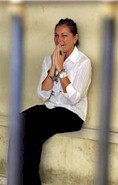The Role Of The AFP
Scrutiny has recently started to focus upon the role of the Australian Federal Police, for a variety of reasons. These range from the potential motivational forces in play with respect to complicity with the Indonesian regime (see Proposition 2), to unresolved issues surrounding events to which they must have been party.
The following aspects have all been previously reported through a diverse range of sources:
Police Corruption
Operation Mocha was a joint investigation by Australian Federal Police and the NSW Crime Commission into a drug syndication ring. It embraced the cocaine shipment that landed at Sydney airport at exactly the same time as Schapelle Corby landed. In fact, they overlapped by over 3 hours [17].
The head of Operation Mocha was former Assistant director of the NSW Crime Commission Mark Standen, who was later arrested for conspiring to import $160 million of pre-cursor drugs into Australia [16] [10]. As operation head the sphere of his influence was clearly significant, although details of exact actions remain vague.
Standen, an ex-AFP officer, had worked in the same office as AFP Commissioner Michael Keelty [18] in Sydney. Whilst Keelty denied reports in ‘The Australian’ newspaper that he and Standen were close [19] [20], he conceded that they ‘might’ have been involved in some of the same operations [18]. Nonetheless, this clearly illustrates the seniority of Mr Standen.
Regarding the AFP, Ray Cooper, former AFP Internal Investigator, suggested that they resisted investigation into police linkage to drug operations due to fear of reputational damage [28]: “I think the leadership of the Federal Police were not capable or strong enough to conduct a thorough and honest and open investigation. They were afraid of their reputation. They wanted the World to believe they were the only police force in the World who didn't have corruption.”
The Whistleblower
There is also the mysterious death of a so-called ‘whistleblower’ in 2002. Gary Lee-Rogers was an Australian Protective Service assistant inspector, who complained about corruption that compromised security at Sydney Airport and who predicted that he would be killed because of what he had allegedly discovered [11] [13] [14].
The Statement to Indonesia
Then there are the astonishing statements made by the AFP commissioner, Michael Keelty. It doesn’t take too long to establish how damaging his media comments were to Schapelle Corby and how helpful to the Indonesian regime, including in potentially covering their tracks with respect to their many legal and human rights abuses [23].
These include his statement during the legal process itself dismissing the baggage-handler proposition [21] [15]. The music to the regime’s ears as he made this remark is not difficult to imagine.
The president of Law Council of Australia himself felt moved to comment on this: “It is potentially damaging to the Corby defence, as it will no doubt be transmitted to Bali” [22], with Schapelle Corby’s lawyer referring to it as "an absolute disgrace".
The words "There is very little intelligence to suggest that baggage handlers are using innocent people to traffic heroin or other drugs between states" are easily translated to “do what you want with her, there will be no difficulties from the police at this end” in the context of the reality of Schapelle Corby’s situation.
It should be noted that the AFP (via Operation Mocha) were actually in the process of investigating the very thing which Schapelle Corby’s lawyer was suggesting, namely, baggage handlers “using innocent people to traffic heroin or other drugs between states”.
A Personal ‘Friendship’
The Chief of Bali Police, I Made Mangku Pastika, had previously been trained in Australia having “attended many AFP training courses” [12]. Indeed, Mr Pastika was reported as being “a personal friend” of Michael Keelty [12], head of the AFP at the time of Schapelle Corby’s case.
The Non-Investigation of a Crime
There are even the questions pertaining to non-investigation. On their own terms, surely “convicted drug smuggler Schapelle Corby” must therefore have been a drug smuggler. In which case, wouldn’t the AFP have had some sort of interest in the source of the drugs? Wouldn’t they have investigated openly and made arrests in Australia? This is particularly moot given the prominence of the case and its wider implications.
Perhaps they didn’t investigate because contrary to the impression their public comments created, they knew that Schapelle Corby was innocent. An investigation would not only have been a waste of time, but worse still, could easily shift focus to some of the murky aspects discussed elsewhere in this proposition.
The AFP were clearly integral to many of these issues, events and incidents. It has been suggested that Schapelle Corby was sacrificed to enable the AFP to secure a positive result with respect to its major operation ‘Mocha’. Having invested so much in this international project it isn’t difficult to see why they would wish to avoid media scrutiny at this critical time of the very same baggage handlers with respect to Schapelle Corby.
Clearly, however, there are plenty of other grave possibilities too, such as major corruption, gross incompetence, and political collusion or complicity.
Next: The Role of the Australian Government
Return to Main Propositions Page
Labels: afp, australian federal police, keelty, operation mocha, standen



<< Home